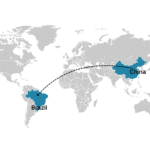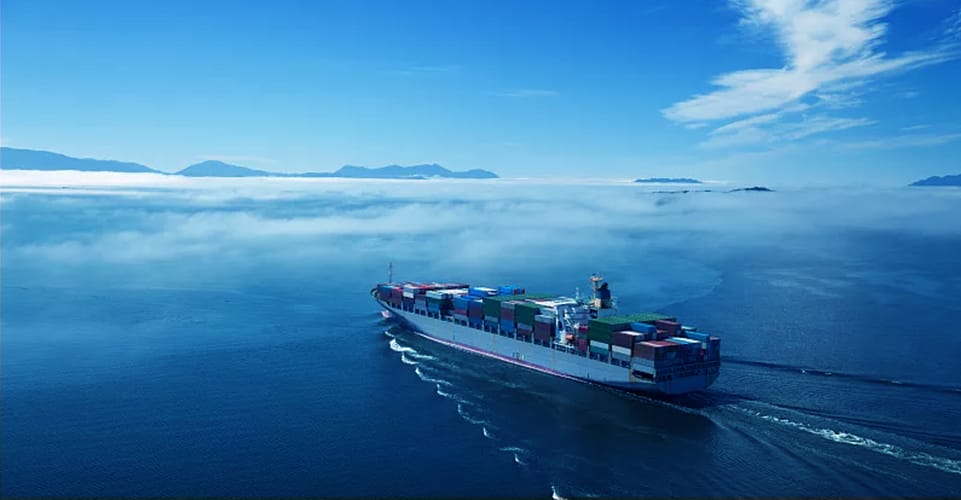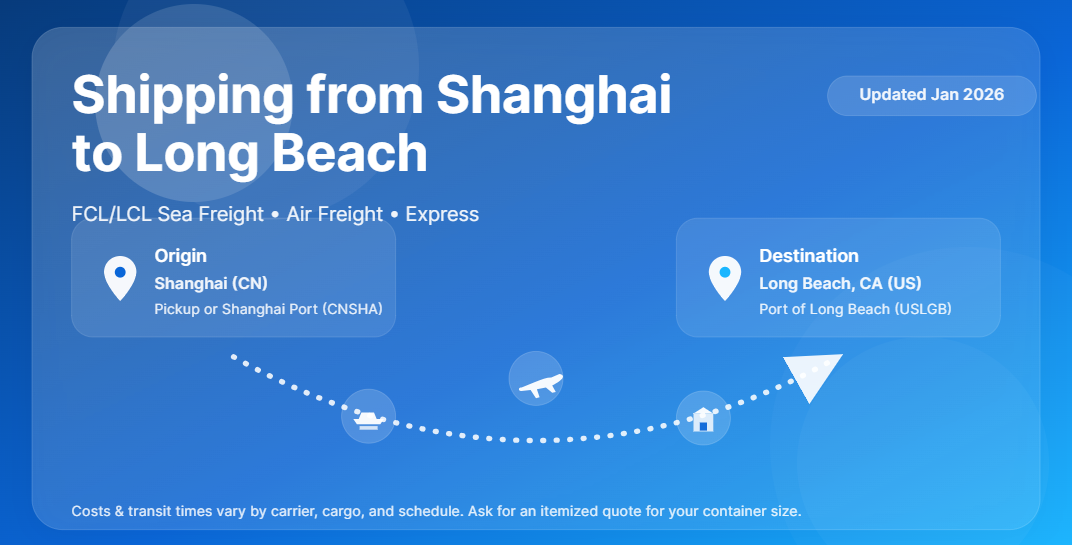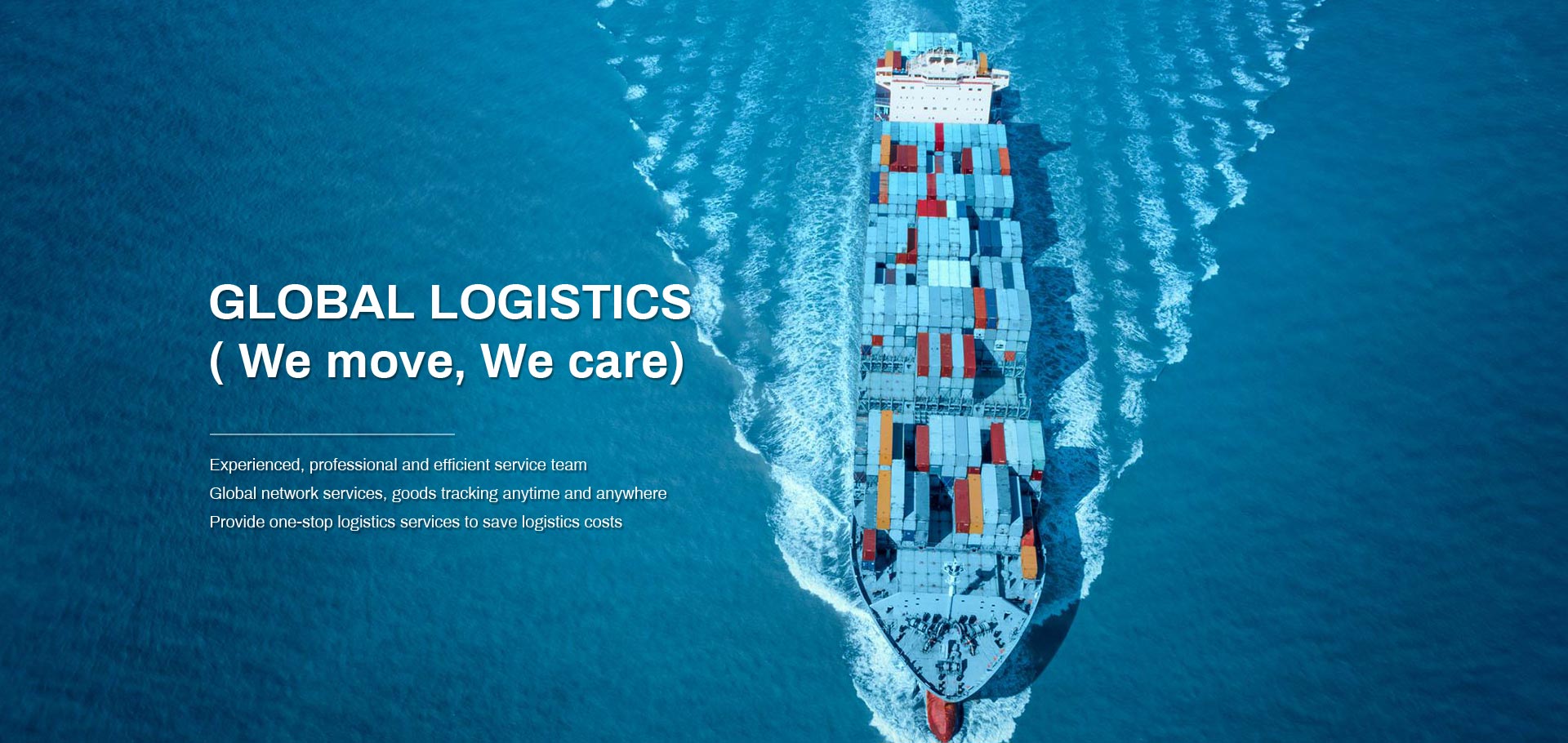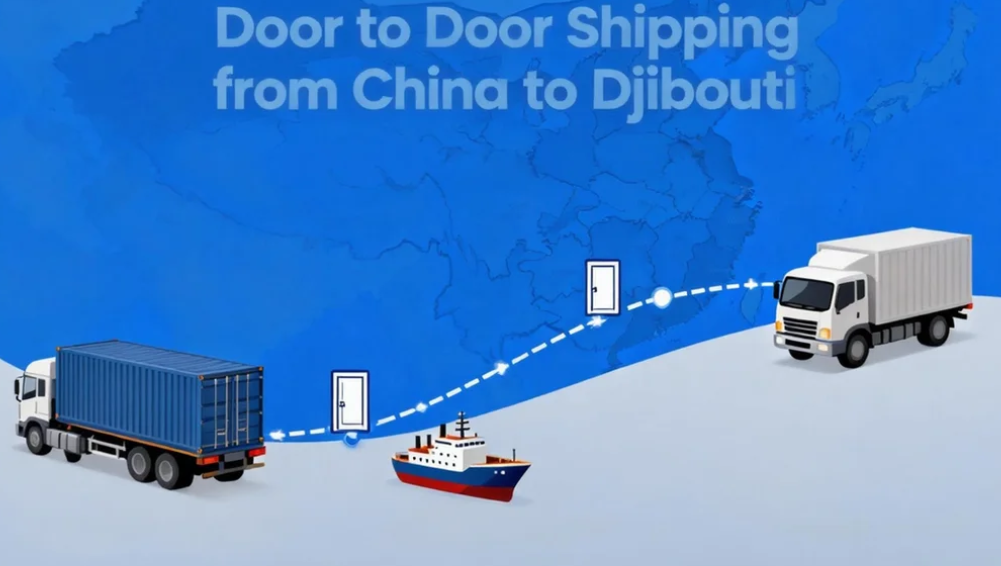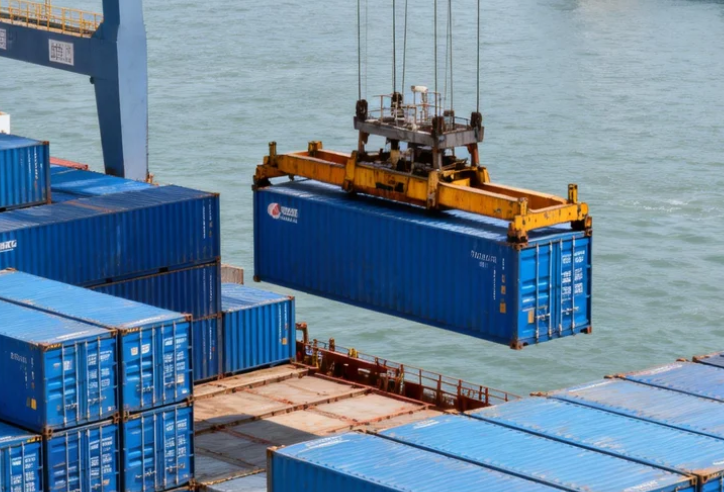Are you curious about shipping rates from China to Mexico and how they can impact your business?
In this comprehensive guide, we will delve into the intricacies of shipping costs, exploring the various factors that influence them and the types of services available. In this blog, you’ll discover key components of shipping rates and effective tips to minimize expenses, ensuring you make informed decisions for your import needs. Let’s navigate the world of international shipping together!
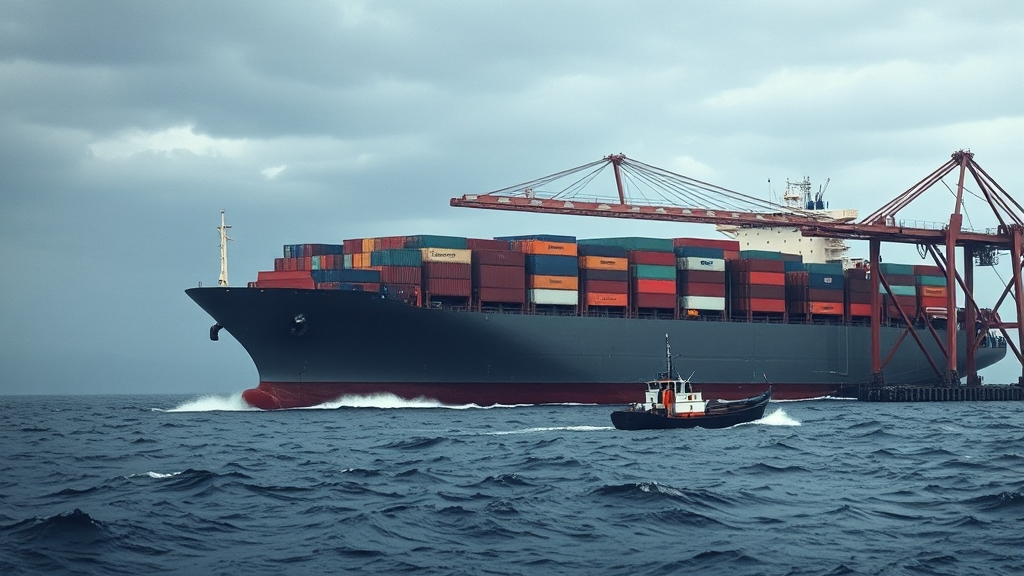
Understanding Shipping Rates from China to Mexico
Importance of Shipping Rates in Importing Goods
Shipping rates play a crucial role in the overall cost structure for businesses importing goods from China to Mexico. Understanding these rates is essential for several reasons:
Cost Management: For importers, knowing shipping rates allows for better budgeting and financial planning. Unexpected shipping costs can erode profit margins; thus, having a clear understanding helps in setting accurate pricing strategies.
Competitive Pricing: Shipping costs can significantly influence the retail prices of imported goods. By understanding and managing these rates, businesses can offer competitive prices in the Mexican market, enhancing their market presence and customer appeal.
Supply Chain Efficiency: Shipping rates directly affect the logistics strategy. By analyzing these costs, businesses can optimize their supply chains for efficiency and cost-effectiveness, ensuring timely delivery while minimizing expenses.
Negotiation Leverage: A comprehensive understanding of shipping rates allows businesses to negotiate better terms with freight forwarders and carriers. This could result in lucrative deals that further enhance profit margins, particularly through options like door to door shipping from China to Mexico.
Factors Influencing Shipping Costs from China to Mexico
Several factors influence shipping costs from China to Mexico, including:
| Factor | Description |
|---|---|
| Distance | The greater the distance between shipping origin and destination, the higher the transportation costs. |
| Shipping Mode | The choice between Air Freight and Ocean Freight affects rates significantly, with air being faster but generally more expensive. |
| Weight and Volume | Heavier and larger shipments incur higher freight charges, as carriers often calculate costs based on dimensional weight. |
| Fuel Prices | Fluctuating fuel prices can lead to changes in shipping rates, impacting overall costs for importers. |
| Customs and Duties | Duties and tariffs imposed by the Mexican government can add to the overall cost, making it essential to account for these in budget planning. |
| Seasonal Demand | Shipping rates can vary seasonally; for instance, peak times like holidays may lead to increased costs due to higher demand. |
| Carrier Choice | Different carriers have various pricing structures, and it’s essential to compare options to find the best deal. |
| Insurance and Additional Services | If you opt for additional services such as cargo insurance or expedited shipping, this will also impact your overall shipping costs. |
Types of Shipping Services Available
Air Freight vs. Ocean Freight: Which is More Cost-Effective?
When importing goods from China to Mexico, businesses typically have the option to choose between Air Freight and Ocean Freight. Each has its own advantages and cost implications:
Air Freight:
- Speed: Ideal for time-sensitive shipments, with delivery taking only 1-5 days.
- Cost: Generally more expensive, with prices ranging from $3 to $10 per kilogram depending on the route and season.
- Ideal For: High-value goods, urgent shipments, or products with shorter shelf lives.
Ocean Freight:
- Cost-Effectiveness: Typically the cheaper option, with rates averaging from $800 to $2,500 per container (20ft) depending on port of origin and destination.
- Delivery Time: Longer transit times, usually around 20-40 days depending on the shipping route.
- Ideal For: Bulk shipments, lower-value goods, or items that are not time-sensitive.
In summary, Air Freight is best for urgent deliveries, while Ocean Freight is more cost-effective for larger and non-urgent shipments.
Express Shipping Options for Urgent Deliveries
For businesses needing to expedite their shipments, express shipping solutions are available. These services prioritize speed and reliability and can significantly reduce transit times. Express options often include:
Express Air Freight: This service ensures that your goods are shipped quickly via air and delivered directly to the designated recipient. While costs are higher than standard air freight, the swift delivery justifies the expense for urgent shipments.
Courier Services: Courier options such as DHL, FedEx, or UPS offer rapid and efficient shipping for smaller packages. These services can deliver within 1-3 days for most locations, making them an excellent choice for urgent documentation or small product shipments.
Priority Ocean Freight: Some shipping lines offer expedited options for ocean freight that reduce transit times by prioritizing your shipment for faster handling, albeit at a premium cost.
In conclusion, businesses importing from China to Mexico must weigh their shipping options carefully. Understanding the implications of shipping rates and selecting an appropriate shipping service based on urgency and cost-effectiveness can significantly impact the success of their import operations. For expert assistance, Dantful International Logistics provides reliable, cost-effective shipping solutions tailored to meet your unique needs.
Key Components of Shipping Rates
Freight Charges: What You Need to Know
When importing goods from China to Mexico, understanding freight charges is essential. Freight charges represent the core cost of transporting your goods from one location to another. Various elements contribute to determining these charges, including the mode of transportation, the weight and size of the shipment, and the distance between the origin and destination. Below are some critical factors that affect freight charges:
Mode of Transport: The choice between Air Freight and Ocean Freight significantly impacts shipping costs. Air Freight is generally faster but more expensive, while Ocean Freight is more economical for larger shipments but takes longer. For more information on shipping costs, you can check the cost of shipping from Vietnam to USA.
Volume and Weight: Shipping costs are typically calculated based on either the actual weight or the volumetric weight of the cargo, whichever is greater. It’s essential to accurately gauge both to avoid unexpected costs.
Origin and Destination Ports: The specific ports involved can also influence costs. Major ports like Shanghai or Shenzhen may have different rates compared to smaller ports.
Seasonal Variations: Shipping rates can fluctuate based on seasonal demand. Peak seasons, such as the holiday period, often see increased prices due to higher shipping volumes.
To provide a clearer picture, here’s a sample table comparing estimated freight charges from major cities in China to Mexico:
| Origin City | Destination Port | Estimated Freight Charge (Ocean Freight) | Estimated Freight Charge (Air Freight) |
|---|---|---|---|
| Shanghai | Manzanillo | $1,200 | $5,000 |
| Shenzhen | Veracruz | $1,100 | $4,800 |
| Guangzhou | Mexico City | $1,300 | $5,200 |
| Ningbo | Cancun | $1,250 | $5,050 |
Additional Costs: Customs Duties, Taxes, and Fees
In addition to freight charges, other costs are associated with importing goods from China to Mexico. Understanding these additional costs is crucial for budgeting and ensuring your shipment is delivered without delays. Key components include:
Customs Duties: These are tariffs imposed by the Mexican government on imported goods. The duty rates can vary based on the product category and are usually calculated as a percentage of the shipment’s value. It’s vital to check the Harmonized System (HS) code for accurate duty rates.
Taxes: In Mexico, imported goods are subject to the Value Added Tax (VAT), typically around 16%. This tax is levied on the customs value plus any other duties and fees. For more information on customs processes, you can visit the import procedure from China to Mexico.
Handling Fees: Various handling fees may apply during the shipping process, including terminal handling charges and documentation fees. These can vary by shipping line or freight forwarder.
Insurance: While optional, obtaining insurance for your shipment is advisable to protect against loss or damage. The cost of insurance will depend on the value of the goods being transported.
READ MORE:
- Shipping From China to the USA
- Shipping From China TO Canada
- Shipping From China TO Mexico
- Shipping From China to Panama
- Shipping From China to Costa Rica
- Shipping From China to Brazil
- Shipping From China TO Colombia
- Shipping From China to Jamaica
- Shipping From China to Venezuela
- Shipping From China to Argentina
Tips for Reducing Shipping Costs
Choosing the Right Shipping Method
Selecting the appropriate shipping method can lead to significant savings. Here are some considerations:
Balance Cost and Speed: If time is not a constraint, opting for Ocean Freight over Air Freight can save considerable money. However, if your goods are time-sensitive, express services may be worth the extra cost. For insights on shipping from China to various locations, refer to Shipping From China to USA.
Evaluate Service Providers: Different freight forwarders offer various rates and services. It’s beneficial to get quotes from multiple providers, including Dantful International Logistics, known for cost-effective solutions.
Consolidating Shipments to Save Money
Consolidating shipments is another effective way to reduce shipping costs. This strategy involves combining multiple small shipments into one larger shipment, which can significantly cut down on per-unit shipping charges. Here are some tips on how to consolidate effectively:
Use a Freight Forwarder: Freight forwarders like Dantful International Logistics can help you consolidate shipments efficiently. They have the expertise to navigate logistics better and save you money.
Plan Ahead: By planning your purchases and shipments in advance, you can group items together, maximizing container space and minimizing costs.
Shared Containers: Consider using shared container services, which allow you to share shipping space with other importers. This method is commonly used in LCL (Less than Container Load) shipping and can be more economical than booking an entire container.
By understanding key components of shipping rates and implementing these cost-saving strategies, you can optimize your import operations from China to Mexico while ensuring that your business remains competitive in the marketplace.
Working with Freight Forwarders
Benefits of Using a Freight Forwarder for Your Shipments
Utilizing a freight forwarder can significantly enhance your shipping experience when importing goods from China to Mexico. Here are some of the key benefits:
Expert Knowledge: Freight forwarders, such as Dantful International Logistics, possess extensive knowledge of international shipping regulations, documentation, and procedures. Their expertise ensures that your shipments comply with both Chinese and Mexican customs requirements, reducing the risk of delays or fines.
Cost-Effectiveness: Freight forwarders have established relationships with shipping carriers and can negotiate better shipping rates. This means you might benefit from lower costs than if you were to arrange shipping independently. For instance, you may want to explore the shipping rates from china to usa for a broader understanding of potential costs.
Comprehensive Services: A reputable freight forwarder offers a range of services including ocean freight, air freight, rail freight, customs clearance, and door-to-door delivery. This one-stop solution simplifies the logistics of your shipment, allowing you to focus on your core business activities.
Risk Management: By partnering with a freight forwarder, you gain access to insurance options that can protect your goods during transit. This is particularly important for high-value shipments, providing peace of mind that your investment is secured. You can learn more about Insurance Services offered by freight forwarders.
Time Efficiency: Freight forwarders streamline the shipping process, ensuring timely deliveries. They manage all logistics aspects, including booking cargo space, preparing necessary documentation, and coordinating with carriers, which minimizes potential delays.
How to Choose the Right Freight Forwarder for China to Mexico Shipping
Selecting the appropriate freight forwarder is crucial for a smooth shipping experience. Here are some key considerations when choosing a freight forwarder for your shipments from China to Mexico:
Experience and Reputation: Look for a freight forwarder with a proven track record in shipping between China and Mexico. Check online reviews, testimonials, and industry ratings to gauge their reliability and expertise. A good place to start is by reviewing Dantful International Logistics for their service offerings.
Range of Services: Ensure the freight forwarder offers comprehensive logistics solutions tailored to your needs, including customs clearance, shipping insurance, warehouse facilities, and options for both air and ocean freight.
Transparency in Pricing: A good freight forwarder provides clear and detailed quotes, including all potential costs. This transparency helps you avoid hidden fees that can inflate your total shipping expenses. It’s useful to compare across different options, such as the cost of shipping from Vietnam to USA, to understand your budget better.
Customer Support: Choose a forwarder that offers excellent customer service. They should be readily available to answer questions, provide updates on your shipment status, and assist with any issues that may arise during transit.
Technology and Tracking Capabilities: In today’s digital age, it is essential for a freight forwarder to offer advanced tracking capabilities. This technology allows you to monitor your shipment in real-time, providing peace of mind and ensuring efficient logistics management.
Conclusion
In conclusion, partnering with a qualified freight forwarder, such as Dantful International Logistics, can greatly enhance your shipping process from China to Mexico. By leveraging their expertise, comprehensive services, and established industry relationships, you can ensure cost-effective, timely, and efficient logistics management. Whether you are a seasoned importer or navigating international shipping for the first time, the right freight forwarder can be a pivotal factor in your success. For more information on freight forwarding, visit Dantful’s resources.

Young Chiu is a seasoned logistics expert with over 15 years of experience in international freight forwarding and supply chain management. As CEO of Dantful International Logistics, Young is dedicated to providing valuable insights and practical advice to businesses navigating the complexities of global shipping.




